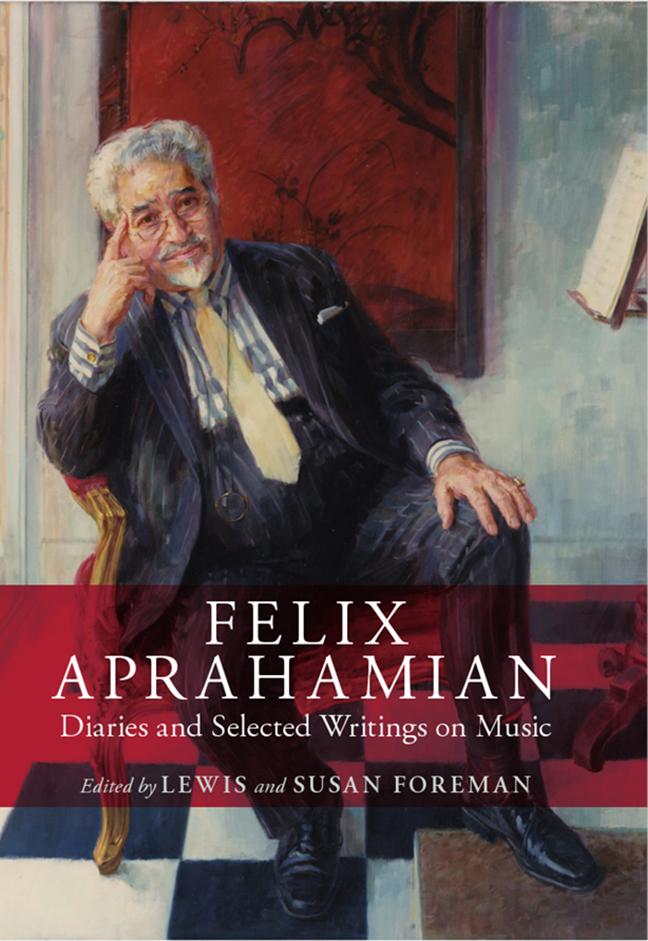Book contents
- Frontmatter
- Contents
- Illustrations
- Foreword
- Preface
- Acknowledgements
- Introduction: Felix Aprahamian: A Life in Music and Criticism (5 June 1914 – 15 January 2005)
- Part I The Musical Diaries of Felix Aprahamian
- Part II Articles and Reminiscences about Friends and Contemporaries
- Part III Remembering the Great Organists
- Select Bibliography
- Index
- Previous Books by Susan and Lewis Foreman
Foreword
Published online by Cambridge University Press: 20 December 2023
- Frontmatter
- Contents
- Illustrations
- Foreword
- Preface
- Acknowledgements
- Introduction: Felix Aprahamian: A Life in Music and Criticism (5 June 1914 – 15 January 2005)
- Part I The Musical Diaries of Felix Aprahamian
- Part II Articles and Reminiscences about Friends and Contemporaries
- Part III Remembering the Great Organists
- Select Bibliography
- Index
- Previous Books by Susan and Lewis Foreman
Summary
First it was simply the by-line itself. Next to Rafael Kubelik, no name sounded more glamorous, exotic or full of Eastern promise to a lateteenage London schoolboy than Felix Aprahamian, whom, as second string to the great Ernest Newman on The Sunday Times, I read avidly every week. Newman was very much living on his reputation in the early 1950s, occasionally reviewing new opera productions and important concerts, but more often returning to the broader issues of music, frequently ending his articles with the phrase (unthinkable today) ‘I will return to this theme next week’. No wonder that E. C. Bentley accurately summed him up with the clerihew ‘Said Ernest Newman/ Next week Schumann,/ But when it came/ It was Wagner again.’ I recall this in order to give some idea of how refreshing it was to find Newman's able lieutenant writing about a raft of the week's performances (a surprising number of which I often found I had attended), in a way that engaged one's attention and aroused admiration for the writer's ability to convey multum in parvo. Actually, the Aprahamian writings that I most strongly recall during that time – the very early days of LP – were his record reviews. I well remember resisting the urgings of the young man behind the counter at the EMG record shop – a certain Edward Perry (later the founder of Hyperion Records) – to buy the first ever LP of Brahms's Symphony No. 3 because ‘Felix Aprahamian in The Sunday Times says the string tone is too wiry’. ‘Nonsense’, said Ted, ‘and I’ll tell him so next time he comes in’. I was extremely impressed that he actually knew this, to me, glamorous figure. Constant Lambert used to claim that, along with Modest Mussorgsky, he had the most inappropriate Christian name of any musician. Exactly the opposite applies in this instance: Mr Aprahamian was Felix by name and Felix by nature.
I was eventually able to put a face to the name in 1957 when, as an Oxford student and conductor of the college orchestra (leader Dudley Moore!), I went to United Music Publishers, next to the British Museum, to ask to see a score of Fauré's Masques et Bergamasques, of which no miniature score existed at the time. ‘Oh, you had better go next door to discuss this with Mr. Aprahamian’, I was told.
- Type
- Chapter
- Information
- Felix AprahamianDiaries and Selected Writings on Music, pp. xi - xiiiPublisher: Boydell & BrewerFirst published in: 2023

